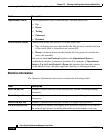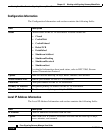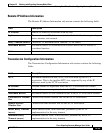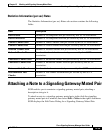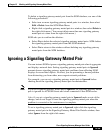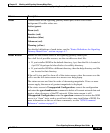
Chapter 13 Working with Signaling Gateway Mated Pairs
Deleting a Signaling Gateway Mated Pair
13-38
Cisco Signaling Gateway Manager User Guide
OL-5805-01
Deleting a Signaling Gateway Mated Pair from Your Network
If you physically delete a known signaling gateway mated pair from your network
(for example, by powering down an ITP), it remains in the SGM database, SGM
labels it Unknown, and it is the system administrator’s responsibility to delete it
from the SGM database, if you choose to do so.
Deleting a Signaling Gateway Mated Pair from the SGM
Database
Typically, you delete a signaling gateway mated pair from the SGM database for
one of the following reasons:
• You have physically deleted the signaling gateway mated pair from your
network. This is the most common reason for deleting a signaling gateway
mated pair from the SGM database.
• The signaling gateway mated pair is Down, Inactive, or Unknown, you are
aware of the reason, and you no longer want to see it in SGM displays. For
example, the signaling gateway mated pair might be a test lab device.
If you have physically deleted a known signaling gateway mated pair from your
network, and you then delete it from SGM, it is no longer in the SGM database,
it does not appear in SGM windows, and it is not discovered when you run
Discovery.
If you have not physically deleted a known signaling gateway mated pair from
your network, and you delete it from SGM, at the next poll SGM finds the
signaling gateway mated pair and adds it back to the SGM database, setting the
status appropriately. If this happens, do not delete the signaling gateway mated
pair again. Instead, set it to Ignored. See the “Ignoring a Signaling Gateway
Mated Pair” section on page 13-39 for more information.
Note If you delete a signaling gateway mated pair from the SGM database, the
signaling gateway mated pair is deleted for all SGM clients and views connected
to that SGM server.



